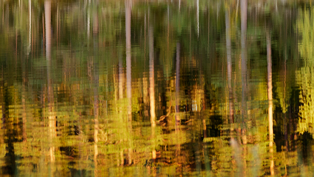The Deep Time of Walden Pond
The Deep Time of Walden Pond: The science and history of the lake Thoreau made famous.

A careful reading of Walden; or, Life in the Woods makes it clear that Thoreau never intended his cabin to be a solitary hermitage, although fans and detractors alike often misunderstand this. It was more an author’s workshop than a fortress of isolation, and throughout his lakeside residency he often visited family and friends in Concord and entertained guests at Walden. Ice-cutters and woodcutters, anglers and boaters, and even a noisy train were as much a part of his surroundings as the lake, woods, and wildlife. He retreated to the cabin largely in order to write in a quieter setting than he could find in town and to “live deliberately, to front only the essential facts of life, and see if I could not learn what it had to teach, and not, when I came to die, discover that I had not lived.”
Thoreau’s cabin experiment was also a field test of the transcendentalist philosophy that Emerson championed. For Emerson, nature represented an embodiment of the divine, an aesthetic ideal that was best described in poetic or quasi-religious abstractions. Contemplating it was a way to transcend normal daily life and seek deeper spiritual lessons. Emerson believed that nature was “all that is separate from us, all which Philosophy distinguishes as the NOT ME,” and “essences unchanged by man; space, the air, the river, the leaf.” Such ideas still resonate with many of us today. Recognizing that satellites now cruise space and our fossil carbon emissions contaminate the air, rivers, and leaves of the entire planet, author Bill McKibben built a similar concept into the title of his groundbreaking book on global warming, The End of Nature.
Read More, and surf the site!...

A careful reading of Walden; or, Life in the Woods makes it clear that Thoreau never intended his cabin to be a solitary hermitage, although fans and detractors alike often misunderstand this. It was more an author’s workshop than a fortress of isolation, and throughout his lakeside residency he often visited family and friends in Concord and entertained guests at Walden. Ice-cutters and woodcutters, anglers and boaters, and even a noisy train were as much a part of his surroundings as the lake, woods, and wildlife. He retreated to the cabin largely in order to write in a quieter setting than he could find in town and to “live deliberately, to front only the essential facts of life, and see if I could not learn what it had to teach, and not, when I came to die, discover that I had not lived.”
Thoreau’s cabin experiment was also a field test of the transcendentalist philosophy that Emerson championed. For Emerson, nature represented an embodiment of the divine, an aesthetic ideal that was best described in poetic or quasi-religious abstractions. Contemplating it was a way to transcend normal daily life and seek deeper spiritual lessons. Emerson believed that nature was “all that is separate from us, all which Philosophy distinguishes as the NOT ME,” and “essences unchanged by man; space, the air, the river, the leaf.” Such ideas still resonate with many of us today. Recognizing that satellites now cruise space and our fossil carbon emissions contaminate the air, rivers, and leaves of the entire planet, author Bill McKibben built a similar concept into the title of his groundbreaking book on global warming, The End of Nature.
Read More, and surf the site!...